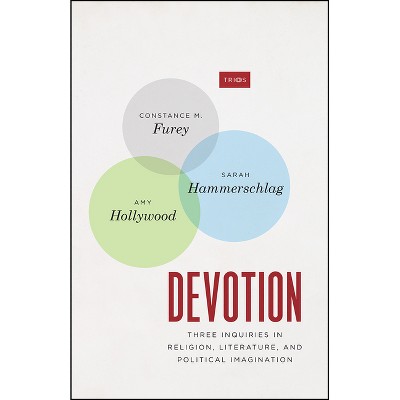Sponsored

Image - (Trios) by Mark C Taylor (Paperback)
$29.00
In Stock
Eligible for registries and wish lists
Sponsored
About this item
Highlights
- The three essays in Image, written by leading philosophers of religion, explore the modern power of the visual at the intersection of the human and the technological.
- About the Author: Mark C. Taylor is professor of religion at Columbia University and the Cluett Professor of Humanities emeritus at Williams College.
- 240 Pages
- Philosophy, Religious
- Series Name: Trios
Description
About the Book
"What are the primary characteristics that define what it means to be human? And what happens to those characteristics in the face of technology past, present, and future? The three essays in Image, by leading philosophers of religion Mark Taylor, Mary-Jane Rubenstein, and Thomas Carlson, play at this intersection of the human and the technological, building out from Heidegger's notion that humans master the world by picturing or representing the real.Taylor's essay traces a history of capitalism, dwelling on the lack of humility, particularly in the face of our own mortality, that is the persistent failure of humans, before turning to art as a possible way to bring us back to earth and recover humility before it is too late. Rubenstein zeroes in on the delusions of imaginative conquest associated with space travel. Through a genealogy of the modern "view from space" from the iconic Earth rise photo of 1968 up to the new privatized American space race, Rubenstein provides an analysis of the perils of the one-world and the false unity it projects. In his essay, Carlson takes as his starting point the surveillance capitalism of facial recognition technology. He dives deep into Heidegger to meditate on the elimination of individuals through totalizing gestures and the relationship between such elimination and our encounters with mortality. Each of these essays, in its own way, reflects on the nature of imagination, the character of technological vision in contemporary culture, and the implications of these for the kinds of sociality and love that condition our human experience"--Book Synopsis
The three essays in Image, written by leading philosophers of religion, explore the modern power of the visual at the intersection of the human and the technological. Modern life is steeped in images, image-making, and attempts to control the world through vision. Mastery of images has been advanced by technologies that expand and reshape vision and enable us to create, store, transmit, and display images. The three essays in Image, written by leading philosophers of religion Mark C. Taylor, Mary-Jane Rubenstein, and Thomas A. Carlson, explore the power of the visual at the intersection of the human and the technological. Building on Heidegger's notion that modern humanity aims to master the world by picturing or representing the real, they investigate the contemporary culture of the image in its philosophical, religious, economic, political, imperial, and military dimensions, challenging the abstraction, anonymity, and dangerous disconnection of contemporary images. Taylor traces a history of capitalism, focusing on its lack of humility, particularly in the face of mortality, and he considers art as a possible way to reconnect us to the earth. Through a genealogy of iconic views from space, Rubenstein exposes the delusions of conquest associated with extraterrestrial travel. Starting with the pressing issues of surveillance capitalism and facial recognition technology, Carlson extends Heidegger's analysis through a meditation on the telematic elimination of the individual brought about by totalizing technologies. Together, these essays call for a consideration of how we can act responsibly toward the past in a way that preserves the earth for future generations. Attending to the fragility of material things and to our own mortality, they propose new practices of imagination grounded in love and humility.Review Quotes
"[Image's essays] exemplify what philosophy of religion can do. They demonstrate that philosophy of religion means something different now. It is not, or no longer, an insular, abstracted subspecialty. What we call philosophy of religion is, now, away of engagement: with the material realities we inhabit, with pressing questions we have about them, and with possible futures they--and so we--might live into."-- "Journal of Religion"
"In this coauthored book, Taylor, Rubenstein, and Carlson deliver richly conceived interpretations of images in modern cultural history... The book combines a sophisticated understanding of specific cases and historical events with analyses of timeless questions that will surely haunt and inspire the human imagination for generations to come... Highly recommended."
-- "Choice""Image is a gorgeous volume of ideas from three of the most significant philosophers of religion and culture. Deep fakes. Love and death. Sun Ra and the absurdity of Silicon Valley futurists--all come together in a way that is accessible and unexpected. This will be essential reading for years to come."--John Lardas Modern, author of Neuromatic; or, A Particular History of Religion and the Brain
"In Image, three distinguished scholars draw inspiration from a host of innovative thinkers to address our contemporary preoccupation with what can only be called the 'posthuman.' It is a small masterpiece. Specialists in religion, philosophy, technology studies, feminist studies, aesthetics, and phenomenology will delight in this book."--Nancy K. Frankenberry, John Phillips Professor in Religion Emerita, Dartmouth College
About the Author
Mark C. Taylor is professor of religion at Columbia University and the Cluett Professor of Humanities emeritus at Williams College. His books include Seeing Silence and Abiding Grace: Time, Modernity, Death, both published by the University of Chicago Press. Mary-Jane Rubenstein is professor of religion and science in society at Wesleyan University. Her books include Pantheologies: Gods, Worlds, Monsters and Worlds Without End: The Many Lives of the Multiverse. Thomas A. Carlson is professor in the Department of Religious Studies at the University of California, Santa Barbara, where he is also the founding director of the Humanities and Social Change Center at UCSB. His books include The Indiscrete Image: Infinitude and Creation of the Human; and With the World at Heart: Studies in the Secular Today, all published by the University of Chicago Press.Dimensions (Overall): 8.5 Inches (H) x 5.5 Inches (W) x .59 Inches (D)
Weight: .72 Pounds
Suggested Age: 22 Years and Up
Number of Pages: 240
Genre: Philosophy
Sub-Genre: Religious
Series Title: Trios
Publisher: University of Chicago Press
Format: Paperback
Author: Mark C Taylor
Language: English
Street Date: September 20, 2021
TCIN: 1006097412
UPC: 9780226782287
Item Number (DPCI): 247-41-4774
Origin: Made in the USA or Imported
If the item details aren’t accurate or complete, we want to know about it.
Shipping details
Estimated ship dimensions: 0.59 inches length x 5.5 inches width x 8.5 inches height
Estimated ship weight: 0.72 pounds
We regret that this item cannot be shipped to PO Boxes.
This item cannot be shipped to the following locations: American Samoa (see also separate entry under AS), Guam (see also separate entry under GU), Northern Mariana Islands, Puerto Rico (see also separate entry under PR), United States Minor Outlying Islands, Virgin Islands, U.S., APO/FPO
Return details
This item can be returned to any Target store or Target.com.
This item must be returned within 90 days of the date it was purchased in store, shipped, delivered by a Shipt shopper, or made ready for pickup.
See the return policy for complete information.
Frequently bought together
Trending Philosophy

$13.99 - $23.05
MSRP $25.00 - $40.00
4.4 out of 5 stars with 199 ratings

$10.23
was $10.78 New lower price
4.6 out of 5 stars with 22 ratings















